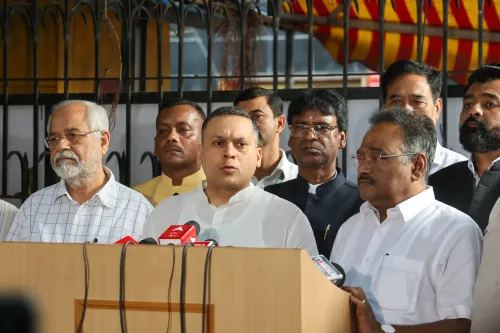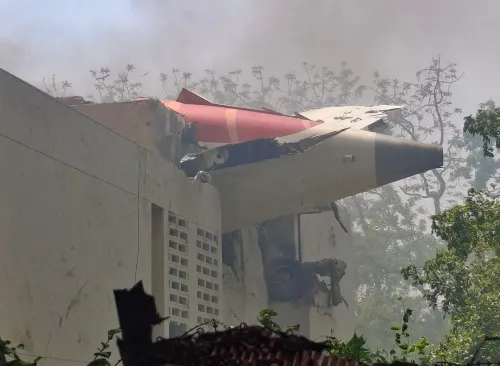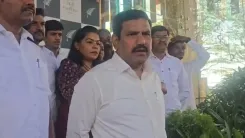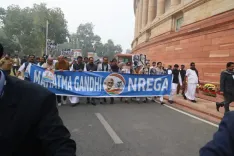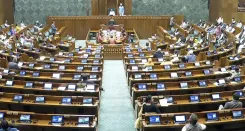Delhi’s Budget Prioritizes Women, Slums, Yamuna, and Health Initiatives
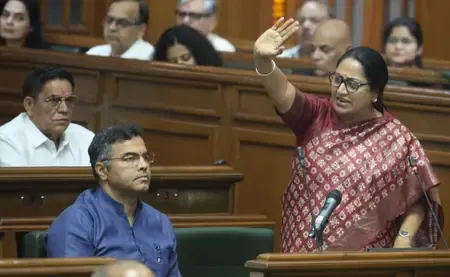
Synopsis
Key Takeaways
- Rs 1 lakh crore budget emphasizes women's aid.
- Focus on infrastructure and public transport improvements.
- Significant allocations for Yamuna cleaning and healthcare.
- Slum redevelopment initiatives with allocated funding.
- Investment in education through new classrooms and laptops.
New Delhi, March 25 (NationPress) - Delhi Chief Minister Rekha Gupta unveiled a Rs 1 lakh crore Budget for 2025-26, emphasizing infrastructure, a Rs 2,500 monthly financial aid scheme for women, transportation improvements, Yamuna river cleaning, new classrooms and laptops for students, and programs aimed at slum redevelopment and social welfare.
The budget for 2025-26 reflects a 31.5 percent increase over the previous year’s budget of Rs 76,000 crore and is 44 percent higher than the revised estimates of Rs 69,500 crore for 2024-25.
Approximately 72 percent of the proposed budget is earmarked for revenue expenditure, while 28 percent is allocated for capital expenditure.
During her presentation, Chief Minister Gupta highlighted ten priority areas for the government, including infrastructure development; health and education for all; enhancing social security and development; ensuring access to water, sanitation, and Yamuna cleaning; promoting industrial development and investment; achieving seamless connectivity; focusing on sustainable development and green growth; enhancing smart governance; improving irrigation and flood control; and supporting tourism, art, language, and culture.
For the monthly financial assistance for women, a significant Rs 5,100 crore has been allocated to support beneficiaries with Rs 2,500 per month.
In the healthcare sector, Rs 2,144 crore has been set aside for the Ayushman Bharat Pradhan Mantri Jan Arogya Yojana (AB-PMJAY) health insurance plan, along with Rs 1,666.66 crore aimed at strengthening critical care facilities through the PM-ABHIM scheme.
For slum development, Rs 696 crore is allocated through the Urban Shelter Improvement Board, along with Rs 100 crore for establishing Atal Canteens to provide nutritious and subsidized food at 100 locations. An additional Rs 20 crore is proposed under the Pradhan Mantri Awas Yojana (Urban) to facilitate affordable housing.
“Delivering clean water and sanitation to every resident of Delhi is the government's fundamental duty, supported by a visionary plan for the water and sanitation sector with an unprecedented Rs 9,000 crore allocation,” stated the Chief Minister.
For the Yamuna cleanup, plans include constructing 40 Decentralised Sewage Treatment Plants costing Rs 500 crore to treat sewage at its source.
Additionally, Rs 40 crore is earmarked for acquiring modern cleaning equipment like trash skimmers, weed harvesters, and dredging utilities for the river.
Another noteworthy health initiative involves Rs 320 crore for expanding Health and Wellness Centres (HWC)/Ayushman Arogya Mandir (AAM), with a goal of establishing 400 centres. These will serve as an upgraded version of the former 'Mohalla Clinic' initiative.
The authorized number of Home Guard Volunteers has been increased to 25,000 from 10,285, a move expected to enhance the bus marshal scheme aimed at women's safety.
Furthermore, Rs 7.5 crore has been allocated to provide free laptops to 1,200 top-performing Class 11 students based on their Class 10 board results.
An investment of Rs 12,952 crore is planned for upgrading Delhi's public transport system, including the addition of over 5,000 electric buses in FY 2025-26.
The Delhi Metro is set to receive Rs 2,929.66 crore for completing the remaining three corridors of Phase-4 - Lajpat Nagar-Saket G Block, Inderlok-Indraprastha, and Rithala-Bawana-Narela-Nathupur (Kundli) - scheduled to commence in 2025-26.
A total of Rs 10,047 crore has been allotted for the social security sector, with Rs 9,780 crore designated for projects related to social welfare, women and child development, and the welfare of SC/ST/OBC communities.
To address significant environmental issues such as air and water pollution, as well as waste management, Rs 506 crore has been allocated to the Environment and Forest departments for monitoring environmental conditions and executing time-sensitive projects.
In her inaugural budget, Rs 300 crore has been designated for “Pollution Control and Emergency measures” to facilitate effective environmental reforms in Delhi.
Additionally, Rs 1,157 crore has been set aside for the Development Department to empower each village and farmer in Delhi, including Rs 4.85 crore for farmers through the ‘PM Kisan Samman Nidhi - State Top-up Scheme’, which provides Rs 3,000 annually in three installments.
The Chief Minister also introduced the ‘Vivaad se Vishwaas' scheme for middle-class traders and committed to ensuring that benefits reach the intended recipients, including verifying beneficiaries of ration, pension, and EWS schemes to eliminate illegal migrants.
Other significant highlights include plans to open two medical colleges, establish a State Guest House, construct auditoriums and stadiums, redevelop Anand Vihar ISBT and Sarai Kale Khan ISBT, and build a new ISBT in Dwarka.
The Chief Minister proposed a state-of-the-art Emergency Operations Centre (EOC) to create a unified emergency contact number for improved crisis management, allocating Rs 30 crore for Command Control Centres and EOC under DDMA.
Moreover, Rs 6,897 crore has been proposed for local bodies in FY 2025-26, with Rs 3,560 crore earmarked for education, healthcare, and sanitation.
For the Delhi Fire Service, Rs 110 crore has been allocated for deploying smaller fire tenders, and Rs 490 crore has been set aside for establishing 200 new courts, along with an additional Rs 200 crore for introducing a hybrid court system.



